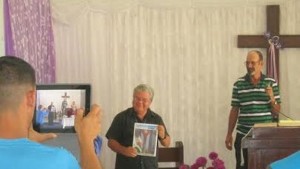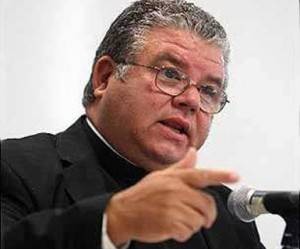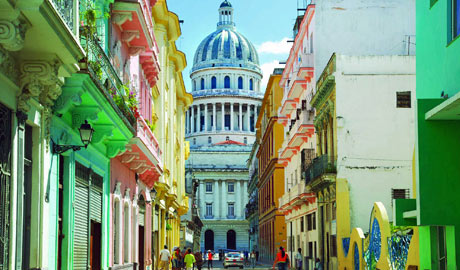“THE (CUBAN) CHURCH HAVE THE RESPONSIBILITY ACCOMPANYING THE PEOPLE FOR THIS NEW PATH”: Priest José Conrado.
From Trinidad, Cuba where is parish, the priest Jose Conrado Rodriguez leaves the journalist Luz Escobar these statements about Cuba and its actual situation at the time; the priest received an award from the Cuban Baptist Institute Patmos.
“The times demand from us a more intense off people, greater commitment to the people and to the side of the people present. I would say are moments of a new sensibility to respond to the call of our people, who have gone through very difficult times. Our people have faced over the years many difficulties and the Church has the responsibility to accompany the people in new ways. This requires new inspiration, a renewed ability to seek paths of hope that will lead to the responsibility of each person to achieve a better Cuba.
Also in Trinidad there is poverty, especially in the field. It is a region of contrasts. Some people will survive with a little more breadth, but there is also great need. That has resulted in people materializes, tipping it slightly to solve material problems and therefore sometimes forget the spiritual dimension of life and commitment to others”.
Question. just received the prize of Patmos Institute of Baptist affiliation Is it possible to reconcile religious differences for the good of Cuba?
“There is no doubt yes. When one gets in an attitude of true love. Love does not exclude love includes. Love crosses borders and breaks down the walls that separate humans. It gives me great satisfaction to people of other Christian denomination positively assess my behavior, but above all they have done so thinking of Cuba. The challenge is to fight for justice, solidarity with those who are violated her rights”.
Yes : The greatest challenges facing the Catholic Church in Cuba today?
“The challenge of fighting for justice, solidarity with those whom you violated your rights or living overwhelmed and drowned by the weight of a very difficult life. Search these ways in which people are made from its decision without forgetting others, not forgetting the opening dimension of love that must always be in the Christian.
In my parish .. we help children by giving them lunch at noon to those who live far from school. Many rural classrooms have closed for economic reasons and then have focused on children in the larger towns, but is far away and return home to eat mean that they can not return to the afternoon session. It is a real problem.
We also visited the sick, the serve. Support for prisoners and families of prisoners is part of our work. We are there, in those situations where human beings are helpless, suffering injustice, without being heard. The pastoral work is accompanying, of listening, of attention, to be there for people.
14ymedio, Havana / Luz Escobar / InternetPhotos / Excerpts/TheCubanHistory.com
The Cuban History, Hollywood.
Arnoldo Varona, Editor.
“LA IGLESIA (Cubana) TIENE LA RESPONSABILIDAD DE ACOMPAÑAR AL PUEBLO POR NUEVOS CAMINOS.” Sacerdote José Conrado.
Desde Trinidad, Cuba donde es párroco José Conrado Rodríguez deja a la periodista Luz Escobar estas sentencias sobre Cuba y su situación, en ese momento recibía el sacerdote el premio cubano del Instituto Bautista Patmos.
Los tiempos que corren exigen de nosotros una presencia más intensa al lado de la gente, un mayor compromiso con el pueblo y al lado del pueblo. Diría que son momentos de una nueva sensibilidad para acudir al llamado de nuestra gente, que ha pasado por épocas muy difíciles. Nuestro pueblo ha tenido que enfrentar a lo largo de estos años muchas dificultades y la Iglesia tiene la responsabilidad de acompañar al pueblo por nuevos caminos. Para ello hace falta una nueva inspiración, una capacidad renovada de buscar caminos de esperanza que nos lleven a la responsabilidad de cada persona con lograr una Cuba mejor.
También en Trinidad hay mucha pobreza, sobre todo en el campo. Es una región de contrastes. Alguna gente va sobreviviendo con un poco más de amplitud, pero también hay mucha necesidad. Eso ha traído como consecuencia que la gente se materialice, se vuelque un poco a resolver los problemas materiales y por lo tanto a veces a olvidar la dimensión espiritual de la vida y el compromiso con los demás.
Pregunta. Acaba de recibir el premio del Instituto Patmos, de filiación bautista ¿Es posible conciliar las diferencias religiosas por el bien de Cuba?
No cabe dudas que sí. Cuando uno se pone en una actitud de verdadero amor. El amor no excluye, el amor incluye. El amor traspasa las fronteras y derriba los muros que separan a los seres humanos. Me da mucha satisfacción que personas de otra denominación cristiana valoren positivamente mi conducta, pero sobre todo que lo hayan hecho pensando en Cuba. El reto es luchar por la justicia, la solidaridad con aquellas personas a quienes le son violados sus derechos.
Pregunta: Los mayores retos de la Iglesia católica en Cuba hoy?
El reto de luchar por la justicia, la solidaridad con aquellas personas a quienes le son violados sus derechos o viven agobiadas y ahogadas por el peso de una vida muy difícil. Buscar esos caminos en los que las personas se realicen a partir de su toma de decisiones pero sin olvidar a los demás, sin olvidar esa dimensión de apertura de amor que tiene que haber siempre en el cristiano.
En mi parroquia.. ayudamos a los niños dándoles al mediodía el almuerzo a los que viven lejos de la escuela. Muchas aulas rurales han tenido que cerrar por cuestiones económicas y entonces se han concentrado a los niños en los pueblos más grandes, pero les queda lejos y volver a sus hogares para comer significaría que no puedan volver a la sesión de la tarde. Es un problema realmente.
También visitamos a los enfermos, los atendemos. El apoyo a los presos y a los familiares de los presos, forma parte de nuestra labor. Estamos allí, en esas situaciones en que el ser humano está desvalido, sufriendo la injusticia, sin ser escuchado. La labor pastoral es de acompañamiento, de escucha, de atención, de estar ahí para la gente.
14ymedio, Havana / Luz Escobar / InternetPhotos / Excerpts/TheCubanHistory.com
The Cuban History, Hollywood.
Arnoldo Varona, Editor.






